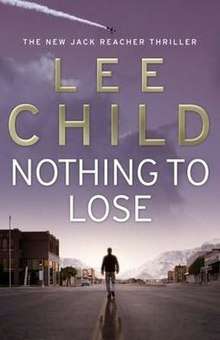Nothing to Lose (novel)
Nothing to Lose is the twelfth book in the Jack Reacher series written by Lee Child. It was published in the UK by Bantam Press in March 2008 and in the US by Delacorte in June 2008. It is written in the third person.
 2008 Hardcover edition | |
| Author | Lee Child |
|---|---|
| Country | United Kingdom |
| Language | English |
| Series | Jack Reacher |
| Genre | Thriller novel |
| Publisher | Bantam Press (UK), Delacorte Press (US) |
Publication date | 24 March 2008 |
| Media type | Print (hardcover) |
| Pages | 426 |
| ISBN | 0-593-05702-3 |
| OCLC | 176649008 |
| Preceded by | Bad Luck and Trouble |
| Followed by | Gone Tomorrow |
Plot summary
As described by Sherryl Connelly of the New York Daily News,[1]
In Child's 12th Reacher novel, "Nothing to Lose," our man has decided to walk across the country diagonally from Maine to California. It's a stroll until he hits Despair, where he's run out of town for just showing up.
The cops drop him at the neighboring town line, Hope. There, a really quite friendly deputy picks him up in a cruiser and they bond, first in trying to find out what kind of hell Despair is in, and then otherwise.
It's a one-man town. Everything, including the excessively profitable metal recycling plant, is owned by a crazed evangelist. But then there's the inexplicably located high-grade military base a couple miles beyond. Despair has more than one secret and won't give them up easily. That makes Reacher mad.
The guy's money when it comes to personally engineered max destruction for the right reasons. The folks in Despair have everything to fear, and nothing to hope for when Reacher comes to town. They just don't know that, until they do.
Similarities to First Blood
Nothing to Lose features several similarities to David Morrell's 1972 novel, First Blood, including the fact that the lead character (a former soldier) is mistaken for a loiterer and harassed by local law enforcement. The name of the town in both novels is "Hope" and the theme of corrupt and bullying authority is also shared.
Morrell's novel was popular in its time and was the inspiration for the hugely successful 1982 film First Blood starring Sylvester Stallone, released to international acclaim.
Style
Andy Martin of The Independent described the writing of the main character to be like "the great Philip Marlowe pulp tradition, nuanced with a dash of Rambo and Bruce Willis."[2]
Critical reception
Peter Millar of The Sunday Times found the novel to be "as gripping and readable as any in the Reacher series", though he considered the main character to be a "socially dysfunctional, second-rate Superman".[3] Henry Sutton in The Daily Mirror wrote that the novel is another example of Child's "brilliantly paced plots".[4]
References
- Connelly, Sherryl (13 June 2008). "Trouble comes to town in Lee Child's new Jack Reacher novel". New York Daily News. Retrieved 20 October 2010.
- Martin, Andy (2 April 2008). "Nothing To Lose, by Lee Child". The Independent. Retrieved 20 October 2010.
- Millar, Peter (11 April 2008). "Nothing to Lose by Lee Child and Steel Witches by Patrick Lennon". The Sunday Times. Retrieved 20 October 2010.
- Sutton, Henry (20 March 2008). "Review: Nothing To Lose". Daily Mirror. Retrieved 20 October 2010.